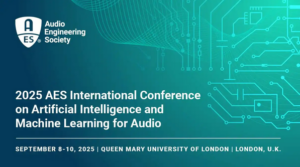DMRN+19: Digital Music Research Network One-day Workshop 2024
Queen Mary University of London
Tuesday 17th December 2024
- Keynote speaker: Stefan Lattner (Research Leader at Sony CSL Paris)
- Registration: Will open in November
- Submission deadline: November 21
- Programme details: TBC
- Proceedings: Uploaded after the workshop
- Join DMRN on Linkedin.
Keynote speakers: Stefan Lattner (Research Leader at Sony CSL Paris)
Tittle: TBC
DMRN+19 is sponsored by
The UKRI Centre for Doctoral Training in Artificial Intelligence and Music (AIM); a leading PhD research programme aimed at the Music/Audio Technology and Creative Industries, based at Queen Mary University of London.
Information on a new AIM CDT call for PhD positions will be on our website soon.
Location: QMUL Mile end Campus (In person)
Call for Contributions –
The Digital Music Research Network (DMRN) aims to promote research in the area of digital music, by bringing together researchers from UK and overseas universities, as well as industry, for its annual workshop. The workshop will include invited and contributed talks and posters. The workshop will be an ideal opportunity for networking with other people working in the area.
* Call for Contributions
You are invited to submit a proposal for a “talk” and/or a “poster” to be presented at this event.
TALKS may range from the latest research, through research overviews or surveys, to opinion pieces or position statements, particularly those likely to be of interest to an interdisciplinary audience. We plan to keep talks to about 15 minutes each, depending on the number of submissions. Short announcements about other items of interest (e.g. future events or other networks) are also welcome.
POSTERS can be on any research topic of interest to the members of the network.
The abstracts of presentations will be collated into a digest and distributed on the day.
* Submission
Please prepare your talk or poster proposal in the form of an abstract (1 page A4, using the template 1-page word template DMRN+19 [DOC 93KB], LaTeX template 2024 [404KB]. Submit it via email to dmrn@lists.eecs.qmul.ac.uk giving the following information about your presentation:
- Authors
- Title
- Preference for talk or poster (or “no preference”)
* Deadlines
21 Nov 2024: Abstract submission deadline
25 Nov 2024: Notification of acceptance
12 Dec 2024: Registration deadline
17 Dec 2024: DMRN+19 Workshop
Registration
The event will be in person but people could follow talks online, registration is mandatory for those coming in person (the registration cost is £25, it covers catering services, coffee and lunch).
Registration link TBC
Programme (TBC by 2nd December) (normally it would be 10:00 am to 5:00 pm)
| 10:00 | Welcome – |
| 10:10 | KEYNOTE
Stefan Lattner (Research Leader at Sony CSL Paris) |
| 11:10 | Break (Coffee break) |
| 11:30 |
Morning Talks |
|
12:45
|
Lunch – Poster Session
|
| 14:15 |
Afternoon Talks |
| 16:30 | Close |
* – There will be an opportunity to continue discussions after the Workshop in a nearby Pub/Restaurant for those in London.
 The
The